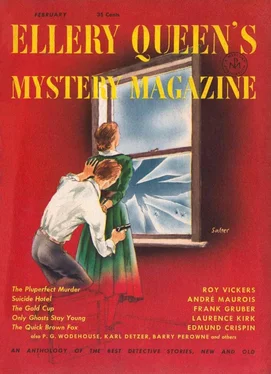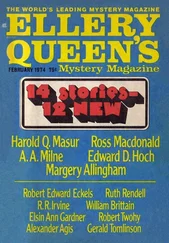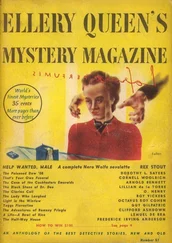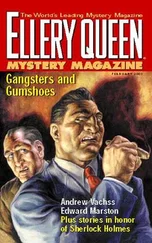E. Ashton - Ellery Queen’s Mystery Magazine. Vol. 19, No. 99, February 1952
Здесь есть возможность читать онлайн «E. Ashton - Ellery Queen’s Mystery Magazine. Vol. 19, No. 99, February 1952» весь текст электронной книги совершенно бесплатно (целиком полную версию без сокращений). В некоторых случаях можно слушать аудио, скачать через торрент в формате fb2 и присутствует краткое содержание. Город: New York, Год выпуска: 1952, Издательство: American Mercury, Жанр: Детектив, на английском языке. Описание произведения, (предисловие) а так же отзывы посетителей доступны на портале библиотеки ЛибКат.
- Название:Ellery Queen’s Mystery Magazine. Vol. 19, No. 99, February 1952
- Автор:
- Издательство:American Mercury
- Жанр:
- Год:1952
- Город:New York
- ISBN:нет данных
- Рейтинг книги:4 / 5. Голосов: 1
-
Избранное:Добавить в избранное
- Отзывы:
-
Ваша оценка:
- 80
- 1
- 2
- 3
- 4
- 5
Ellery Queen’s Mystery Magazine. Vol. 19, No. 99, February 1952: краткое содержание, описание и аннотация
Предлагаем к чтению аннотацию, описание, краткое содержание или предисловие (зависит от того, что написал сам автор книги «Ellery Queen’s Mystery Magazine. Vol. 19, No. 99, February 1952»). Если вы не нашли необходимую информацию о книге — напишите в комментариях, мы постараемся отыскать её.
Ellery Queen’s Mystery Magazine. Vol. 19, No. 99, February 1952 — читать онлайн бесплатно полную книгу (весь текст) целиком
Ниже представлен текст книги, разбитый по страницам. Система сохранения места последней прочитанной страницы, позволяет с удобством читать онлайн бесплатно книгу «Ellery Queen’s Mystery Magazine. Vol. 19, No. 99, February 1952», без необходимости каждый раз заново искать на чём Вы остановились. Поставьте закладку, и сможете в любой момент перейти на страницу, на которой закончили чтение.
Интервал:
Закладка:
“That’s Park Yard,” I told Raffles. “Benjamin, J., lives in Number Four.”
Crossing the street, we passed under the arch with the bracket-lamp into a small, cobbled courtyard enclosed by six narrow little three-storey houses, attached and identical.
“These royalists are out seeing the sights,” said Raffles. “Only one window has a light.”
The light, in one of the two houses across the end, glimmered on a yellow front door with an iron knocker and the number 4.
“That’s Mr. Benjamin’s,” I said, in relief, and I mounted the steps with Raffles behind me leading the dog.
I beat a tattoo with the knocker; the reverberations rang hollow through the dark courtyard. From the far side of the house, which backed on Hyde Park, came a jingling and clip-clopping of carriages. The dog whined, and Raffles, a step below me, stooped to pat him. The lighted window was close to my elbow; flowers in the window-box made a delicate, dark frescoe against the primrose glow through the drawn curtains. I heard no sound within the house.
“Try him again,” Raffles said softly.
But as I raised my hand to the knocker, I heard the bolt shot and the chain rattle. The door opened. Mr. Benjamin’s short, erect figure, in shirt-sleeves, his watch-chain draped across his checked waistcoat, appeared against the dim light within. He peered at us under his bang, his jaws moving on a mouthful.
“Good evening, Mr. Benjamin,” I said cordially. “I’m afraid we’ve taken you away from your supper, but—”
Suddenly Raffles’ hand was on my arm, gripping hard, checking me.
“We were passing, Mr. Benjamin,” he said, “and thought you might be lonely and would like to come and see the sights with us. A big night in the West End! But perhaps,” he added doubtfully, “it’s a bit late for you — past your bedtime?”
“Sirs,” said Mr. Benjamin, making valiant efforts to gulp his mouthful, “much appreciate. Unexpected — take it kindly. A bit late, per’aps — as you say—”
“Never mind,” said Raffles cheerily. “Some other time. Just a passing thought. Good night, Mr. Benjamin.”
“Good night to ’ee, gentlemen.” Mr. Benjamin knuckled his bang. “An’ thank’ee — honoured, I’m sure—”
Raffles’ iron grip on my arm drew me down the steps. I heard the door closed and bolted behind us. I was totally bewildered by the transaction.
“But the dog, Raffles,” I protested. “What—”
“Just so,” said Raffles, “the dog. Didn’t you notice?”
“Notice what?”
“That the dog didn’t know his master,” said Raffles, “and the master didn’t know his dog!” I would have stopped dead, but his arm, now linked in mine, hurried me on out under the arch. “And look at this,” he said. “I saw it lying on the steps when I stooped down to pat the dog.”
His arm still linked in mine, as we crossed the street toward Florian’s, he opened his hand. I saw on the palm a section of silver watch-chain embellished by miniature coach-whips.
“But Mr. Benjamin’s chain wasn’t broken,” I said blankly. “He was wearing it. I saw it. He always wears it. He told me the Duke gave them both a half-hunter and chain when—” I stopped suddenly.
“Exactly,” said Raffles, with a kind of icy vivacity. “The old fox! Coming to the door with his mouthful, to disguise any slight possible discrepancy of intonation — oh, pretty!”
I was thunderstruck. “You mean — that wasn’t our Mr. Benjamin?”
“It was Mr. Benjamin, all right,” said Raffles, “Mr. Benjamin, T.! Brother Jehu!” His tone was suddenly grim. “I’m afraid our Mr. Benjamin is now in alien hands — at the disposal of a monarch who never forgives an injury!”
He pushed open the door of Florian’s.
At once, there was wafted to my nostrils the aroma of Florian’s pies, those succulent concoctions of hare, beefsteak, kidneys, and mushrooms, swimming in a rich burgundy sauce and topped with a crisp, golden crust. My knees wavered. I knew that, before I could bring my mind to bear on the situation which confronted us, I must dine; and I said as much.
Raffles looked at me with concern. “My dear old chap, of course you must dine! I had no idea — Here, let’s take this booth. Richmond!” He beckoned the old waiter, who, a napkin over his arm, hobbled up with such alacrity that his stiff dickey burst from his waistcoat. “The menu, Richmond, and the wine list.”
“Yes, sir,” said Richmond. “Still got Mr. Benjamin’s dog, I see, sir.”
“Yes, we’re looking after him,” said Raffles. “Bring him a bone or something, Richmond. He’s a patient old dog.”
“That he is,” said Richmond, one side of his collar detonating from his stud as he stooped wheezingly to pat the dog. “I like to see them together — Mr. Benjamin and Captain. It does your ’eart good.”
I met Raffles’ grey, keen eyes across the table.
He took out his cigarette-case, selected a Sullivan. While I ate, he leaned back in the settle, sending adrift at the gas-globe on the panelled wall those leisurely smoke-rings which always, with him, were the overt evidence of meditation.
Breaking a silence, he said, “You know, Bunny, I think I’ve always half expected something like this might happen — ever since Benjamin, J., told us his story, and mentioned Colonel Saxe.”
His dark, fine head leaning back against leather, his silk hat gleaming on its hook above him, he narrowed his eyes at the drifting smoke-rings.
“As you know,” he said, “I’ve always made it my business to keep informed as to who’s who at the various Embassies. About eighteen months ago, one Colonel Saxe appeared in London, as an officer on the staff of the military attache at the Embassy of His Imperial Majesty. In actual fact, Colonel Saxe’s real function — as it is the function of some official or other in all Embassies — is clandestine intelligence. In short, he’s in charge of the dirty work. When I heard Mr. Benjamin mention him as having been working at the Palace, at the fountain-head, I wondered whether the Colonel’s banishment to an Embassy might not be due to the leak through Mr. Benjamin. One of His Imperial Majesty’s moves on the European chessboard was spoiled by that leak, and he’d want someone’s head on a charger for it. I fancy the Colonel may have paid the price — and the Colonel is no man to forgive an injury, either!”
He relapsed into thought. Richmond brought the ripe, napkin-wrapped Stilton. He set it down with a slight snapping sound as he shed a rear trouser-button. Raffles crushed out his Sullivan, called for ink and paper. He dipped a pen in the ink-bottle, began to write.
His pen scratched swiftly in the quiet. It was eleven o’clock by the ticking wall-clock, too early for the late-supper trade, and Florian’s was almost empty. Monsieur Florian was clinking sovereigns in the cash-cage; imperfectly concealed by the frosted-glass screen before the service hatch, Richmond, patiently holding up his coat-tails, was having his button sewn on by Madame Florian. Captain rasped at his bone. Raffles folded his letter, tucked it into an envelope, glanced at me as he flicked the gummed edge along his tongue-tip.
“Feeling better, Bunny?”
“Ready for anything.”
He nodded, started on a second letter. He sealed this one, addressed both envelopes, untied Captain from the leg of the settle. He walked up to the cash-cage, gave the envelopes to Monsieur Florian, together with some earnest instructions. Florian nodded his shock of grizzled hair.
“You there, Reechmon’!”
“Sir?” said Richmond, with a start that caused his bowtie to come undone and dangle.
Raffles handed over Captain to him, and the old dog trotted off obediently with Richmond to the kitchen. Raffles came back to take his hat from the hook.
Читать дальшеИнтервал:
Закладка:
Похожие книги на «Ellery Queen’s Mystery Magazine. Vol. 19, No. 99, February 1952»
Представляем Вашему вниманию похожие книги на «Ellery Queen’s Mystery Magazine. Vol. 19, No. 99, February 1952» списком для выбора. Мы отобрали схожую по названию и смыслу литературу в надежде предоставить читателям больше вариантов отыскать новые, интересные, ещё непрочитанные произведения.
Обсуждение, отзывы о книге «Ellery Queen’s Mystery Magazine. Vol. 19, No. 99, February 1952» и просто собственные мнения читателей. Оставьте ваши комментарии, напишите, что Вы думаете о произведении, его смысле или главных героях. Укажите что конкретно понравилось, а что нет, и почему Вы так считаете.












